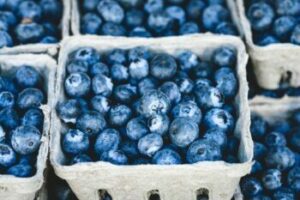
How to say arándanos in English translation?
Blueberries, or “arándanos” in Spanish, are small, round, blue-purple berries that are a popular fruit around the world. They are native to North America but are now grown in many countries, including Chile, Argentina, and Spain.
Blueberries are low in calories and high in nutrients, making them a healthy addition to your diet. They are an excellent source of vitamin C, vitamin K, and dietary fiber, and are also a good source of manganese. They contain antioxidants called anthocyanins, which give the fruit its blue color and may help protect the body against damage from free radicals.
Blueberries are a versatile fruit that can be eaten fresh or cooked. They are commonly used in baked goods like muffins, pies, and pancakes, and can also be added to salads, smoothies, and yogurt. Blueberry jam and jelly are also popular condiments.
In addition to their culinary uses, blueberries have been studied for their potential health benefits. Research has suggested that consuming blueberries may help improve cognitive function, reduce inflammation, lower blood pressure, and improve insulin sensitivity.
When purchasing blueberries, look for ones that are firm, plump, and have a deep blue color. Avoid ones that are soft, wrinkled, or have mold. Blueberries can be stored in the refrigerator for up to a week, and can also be frozen for long-term storage.
In conclusion, “arándanos” or blueberries are a healthy and delicious fruit that can be enjoyed in a variety of ways. They offer a range of health benefits and are readily available in many parts of the world. Consider incorporating blueberries into your diet for a tasty and nutritious snack or ingredient.
Sentences with the word arándanos in Spanish
| La abuela preparó dos tartas de arándanos. | – | Grandma made two blueberry tarts. |
| Aquellos arándanos tapizan las empinadas laderas de esta zona. | – | Those blueberries cover the steep slopes of this area. |
| Los arándanos son unas bayas exquisitas. | – | Blueberries are delicious berries. |
| Ayer preparó una tarta de queso fresco y arándanos. | – | Yesterday she made a fresh blueberry cheesecake. |
| Los arándanos son oriundos de Asia y Europa. | – | Blueberries are native to Asia and Europe. |
| Podemos visualizar como los arándanos crecen en terrenos húmedos. | – | We can visualize how blueberries grow in moist soil. |
| Los arándanos son unas bayas esféricas del tamaño de una aceituna. | – | Blueberries are spherical berries the size of an olive. |
| El consumo de arándanos aporta mucha vitamina C. | – | The consumption of blueberries provides a lot of vitamin C. |
| La tía utiliza superficialmente esos arándanos en las inflaciones leves de la mucosa. | – | The aunt uses these blueberries superficially in the slight inflammations of the mucosa. |
| ¿Te gustan los arándanos? | – | Do you like blueberries? |
| ¿Cuántos arándanos te vas a comer? | – | How many blueberries are you going to eat? |
| Ella ayer compró una bolsa llena de arándanos. | – | Yesterday she bought a bag full of blueberries. |
| Se comió todos los arándanos. | – | She ate all the blueberries. |
| Todos esos arándanos maduraron durante el verano. | – | All those blueberries ripened over the summer. |
| Los arándanos se acabaron rápido. | – | The blueberries are gone fast. |
| Ella les llevó una bolsa llena de arándanos a sus amigos. | – | She brought a bag full of blueberries to her friends. |
| ¿Cuántos arándanos compraste? | – | How many blueberries did you buy? |
| La producción de arándanos ha sido muy provechosa. | – | Blueberry production has been very profitable. |
| Ya no quedan arándanos. | – | There are no blueberries left. |
| Los niños de la casa se comieron todos los arándanos. | – | The children in the house ate all the blueberries. |
| Te traje unos arándanos porque sé que a ti te gustan mucho. | – | I brought you some blueberries because I know you like them a lot. |
| ¿No eran los arándanos tus bayas favoritas? | – | Weren’t blueberries your favorite berries? |
| Comparte esa tarta de arándanos con tu hermana. | – | Share that blueberry pie with your sister. |
| ¿Cuántos arándanos trajiste? | – | How many blueberries did you bring? |
| Se los comió todos, a pesar de que no le gustaban los arándanos. | – | She ate them all, even though she didn’t like blueberries. |
| Hace rato que no venía arándanos por aquí. | – | It’s been a while since blueberries came here. |
| Me quedan varios arándanos. | – | I have several blueberries left. |
| Recoge los arándanos qué está en el patio. | – | Pick up the blueberries that are in the yard. |
| Deja qué esos arándanos se maduren. | – | Let those blueberries ripen. |
| Preparé las tartas de arándanos para la actividad. | – | I made the blueberry tarts for the activity. |